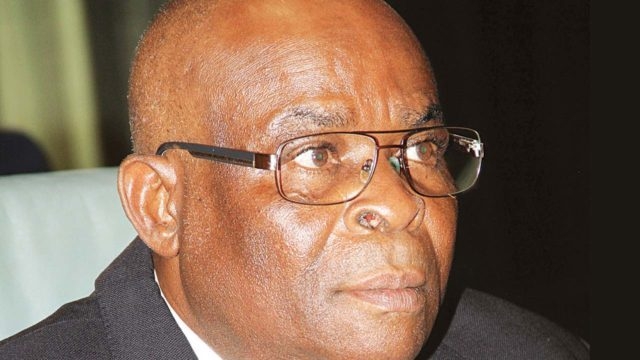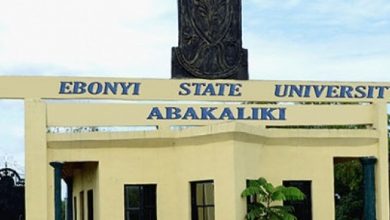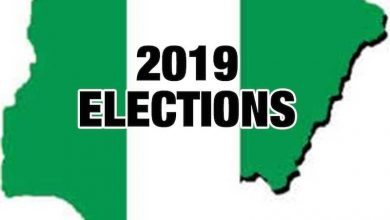
FORUM OF PRESIDENTIAL CANDIDATES BACKS FEDERAL GOVERNMENT SUSPENSION OF ONNOGHEN

The forum noted that, most opinions and condemnations being voiced out are premised on emotions, sentiments, political affiliation and all you can think of, but emphasized that Onnoghen must not be seen as above the law.
‘Divergent reactions have greeted the suspension of Hon. Justice Walter Samuel Onnoghen as the Chief Justice of Nigeria, CJN, and the subsequent swearing in of His Lordship, Hon. Justice Mohammed Tanko as the Acting CJN’, the body noted.
‘The episode began with the arraignment of Justice Onnonghen before the Code of Conduct Bureau on Monday 14th January on charges of false declaration of assets. Although the allegations in the petition to the Code of Conduct Bureau are grievous enough in themselves, security agents are said to have also traced other suspicious transactions running into millions of dollars to the CJN’s personal accounts, all undeclared or improperly declared as required by law’, the statement.
‘Surprisingly, reactions to this ugly revelation, coming mainly from senior legal practitioners, are not based on the law as it is. Most opinions and condemnations being voiced out are premised on emotions, sentiments, political affiliation and all you can think of, but law’.
‘The starting point is to examine the proposed charge(s) against His Lordship. The suspended CJN is alleged to have maintained foreign accounts and domiciliary accounts in foreign currency; His Lordship is alleged to have failed to declare his assets in violation of the Code of Conduct for Public Officers’.
The body supported its position with what the constitution said as relates to Onnoghen suspension as follows; Schedule V, Part 1, of the 1999 Constitution of the Federal Republic of Nigeria, as amended provides in paragraph 11,”Subject to the provisions of this Constitution, every public officer shall within three months after the coming into force of this Code of Conduct or immediately after taking office and thereafter –
At the end of every four years; and at the end of his term of office, submit to the Code of Conduct Bureau a written declaration of all his properties, assets, and liabilities and those of his unmarried children under the age of eighteen years.
Any statement in such declaration that is found to be false by any authority or person authorised in that behalf to verify it shall be deemed to be a breach of this Code.”, adding that the same law provides that no public officer shall maintain any foreign account.
The Group also pointed out that the constitution made provision for what is now applied on the case of the former Chief Justice of Nigeria(CJN), stressing that this is contained in the schedule V part ii of the 1999 Constitution as amended.
Penpushing also reports that, the forum argued that, without much ado one can safely submit that the suspended Chief Justice of Nigeria, is a Public Officer, and is also bound by the provisions of the Code of Conduct for Public Officers as contained in the Constitution of the Federal Republic.
The fourth step is to examine the law as to what step could be taken by the Federal Government, through the Attorney General of the Federation when there is a breach or an alleged breach of any of these provisions.
The forum also added that, in similar vein, paragraph 12 of part 1 in the fifth schedule to the 1999 constitution provides that, “Any allegation that a public officer has committed a breach of or has not complied with the provisions of this Code shall be made to the Code of Conduct Bureau.”
‘Now, what the Presidency has done is nothing but complying with the law. Indeed, by virtue of the Interpretation Act, the President has the right to suspend any public officer from office. Then one wonders why the hullabaloo?’
‘Those who oppose the step being taken by the Federal Government have advanced basically three arguments. First, they claim that the independence of the judiciary is paramount. They have, however, forgotten to differentiate between the person of Mr. Hon. Justice Onnoghen as a Nigerian who is not above the law and who could commit offence; a Nigerian who is not immune and who is not better than many others His Lordship had tried and sentenced’.
Penpushing further reports that, the forum stated that, the proponents of independence of the judiciary have failed, whether by commission or omission, to see that the office of the Chief Justice of Nigeria(CJN) is what is meant by judicial independence and not the person in the office.
‘They have refused to appreciate the necessity of subjecting every person to equal treatment before the law, knowing that failure to do so portends great risk to our commonwealth’.
‘The second reason being put forward by defenders of His Lordship, Hon. Justice Onnoghen is that the timing of the arraignment is suspect. According to them, the proposed charge is akin to an attempt by the ruling political party to compromise Election Petitions. This argument is untenable’.
‘An offence can only be reported and tried whenever discovered. The suspended CJN must be prepared to face and stand trial. And the burden is on His Lordship to prove his innocence as Paragraph 11.3, Part 1 of Schedule V of the 1999 Constitution deems a defendant not guilty until the contrary is proved’.
The Group also noted that, any property or assets acquired by a public officer after any declaration required under this Constitution and which is not fairly attributable to income, gift, or loan approved by this Code shall be deemed to have been acquired in breach of this Code unless the contrary is proved.
The forum also nullified argument that the Federal Government cannot remove the Chief Justice of Nigeria (CJN) without following due process, positioning that the conclusion drawn by those against the prosecution of was not tenable.
‘The CJN cannot be removed except by recommendations of the NJC. His Lordship can, however, be prosecuted by the Code of Conduct Bureau and a conviction by the Code of Conduct Tribunal can be a basis for NJC’s recommendation for remova’l.
The body said, ’let us allow the rule of law and not the law of rulers to prevail. Hon. Justice Walter Samuel Onnoghen is just another Nigerian who should subject himself to laws that govern all Nigerians. We wonder why some people are even crying more than the bereaved. After all, Hon. Justice Onnoghen himself has admitted that he ‘forgot’ to make full declaration. But the question is whether the reason is an excuse in law’.
The Forum said with the ugly development, it was clear that there are rot in the judiciary,’ let no SAN bamboozle or hoodwink us into allowing the mess to continue. Therefore, as responsible actors in Nigeria’s political system, we have come to the conclusions: that the offence allegedly committed by Hon. Justice Onnoghen is not judicial that could have warranted the intervention of NJC’.
That the constitution recognises the holder of the office of CJN as the 1st public officer in Nigeria, and that the suspension of the Chief of Justice of Nigeria (CJN) cannot be equated with removal as envisaged in the constitution.
‘The suspension by the President does not, therefore, require the input of the NJC and the National Assembly. That we do not believe the action taken by the President will have any negative effect on the forthcoming general elections’.
‘That we urge the National Assembly, as it reconvenes, to view the President’s action as non-partisan or motivated by any mundane consideration, but taken purely in the best interest of Nigeria. That politicians and interest groups should desist from misinforming the people on the patriotic move by the President.
‘Nigerians and the international community should appreciate the need for the bold action by our government and give the needed support to ensure that the country evolves an unblemished and egalitarian society where all citizens are treated equally and fairly, irrespective of their status.






